Freight Forwarders: Unlocking the Secrets of Efficient International Trade
In the intricate web of global commerce, freight forwarders stand as vital intermediaries, unlocking the secrets of efficient international trade. These logistics experts play a crucial role in navigating the complex landscape of international shipping, ensuring that goods move seamlessly from origin to destination. This article delves into the pivotal functions of freight forwarders, highlighting their indispensable role in facilitating efficient and cost-effective international trade. With the keyword “freight forwarder” at its core, we explore how these professionals are the unsung heroes of the global supply chain.
The Role of Freight Forwarders: Navigating Complexity
Freight forwarders act as the orchestrators of international shipments, managing the entire logistics process on behalf of their clients. From sourcing reliable carriers and negotiating freight rates to handling customs clearance and documentation, freight forwarders handle a multitude of tasks that ensure goods arrive safely and on time. Their expertise in international trade regulations, shipping routes, and logistics infrastructure enables them to navigate the complexities of cross-border shipping, simplifying the process for shippers and importers alike.

Customs Clearance and Compliance
One of the most critical services provided by freight forwarders is customs clearance and compliance. Navigating the labyrinth of international trade regulations, tariffs, and quotas requires a deep understanding of customs procedures and documentation. Freight forwarders possess this expertise, ensuring that shipments meet all necessary requirements, avoiding delays, fines, and potential seizures. Their ability to streamline customs processes is crucial in maintaining the fluidity of international trade and minimizing disruptions to the supply chain.
Cost Optimization and Risk Management
Freight forwarders are adept at optimizing shipping costs and managing risks associated with international trade. By leveraging their extensive network of carriers and suppliers, they can negotiate competitive freight rates, ensuring that shippers get the best value for their money. Additionally, freight forwarders employ risk management strategies to mitigate potential disruptions, such as carrier delays, weather events, and geopolitical unrest. Their proactive approach to managing risks helps maintain the reliability and predictability of international shipments.
Technology and Innovation in Freight Forwarding
The freight forwarding industry is increasingly embracing technology to enhance efficiency and transparency. Freight forwarders utilize advanced logistics software, tracking systems, and data analytics to monitor shipments in real-time, predict delays, and optimize routes. These technological advancements not only improve the visibility and control over shipments but also enable freight forwarders to provide personalized service and tailored solutions to their clients. By staying ahead of technological trends, freight forwarders continue to unlock new efficiencies in international trade.
Sustainability and Ethical Practices
In an era where sustainability is paramount, freight forwarders are also playing a pivotal role in promoting eco-friendly practices within the logistics industry. They are increasingly adopting green shipping solutions, such as fuel-efficient vessels, carbon-neutral transportation options, and sustainable packaging materials. Furthermore, freight forwarders are committed to ethical practices, ensuring that their operations comply with international labor standards and human rights laws. Their commitment to sustainability and ethics underscores the importance of responsible and mindful logistics in fostering a more equitable and environmentally friendly global trade system.
Conclusion
Freight forwarders are the unsung heroes of international trade, unlocking the secrets of efficient and cost-effective logistics. Their expertise in navigating complex trade regulations, optimizing costs, managing risks, and embracing technological innovations ensures that the global supply chain remains fluid, reliable, and resilient. As the world becomes increasingly interconnected, the role of freight forwarders will continue to grow in importance, driving the efficiency and sustainability of international trade. By partnering with freight forwarders, shippers and importers can leverage their expertise to unlock new opportunities in the global marketplace, fostering economic growth and prosperity worldwide.
